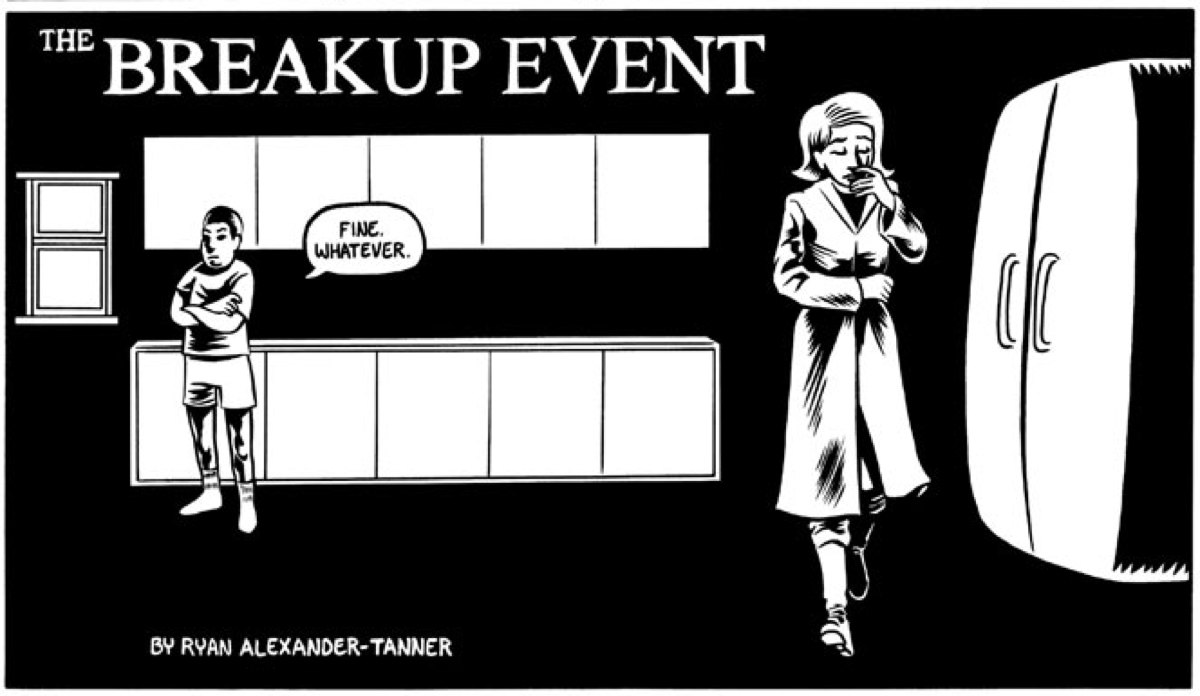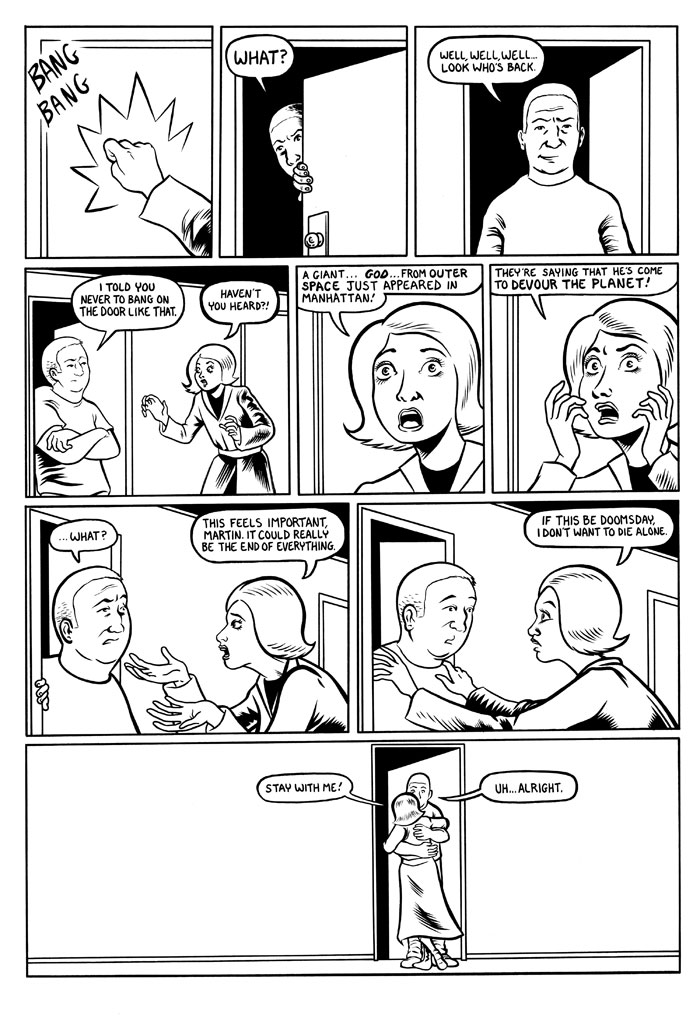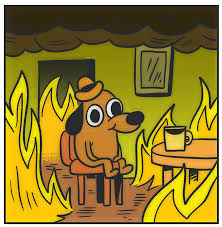Ryan Alexander-Tanner (To Teach) has a comic up on Study Group right now called “The Breakup Event” that’s a clever meta commentary on….well, go read it right now. It will only take a few moments. Then come back and let’s discuss.
Ready?
The Breakup Event is something very natural that happens to adults who read superhero comics. At some point, you realize you’ve read this story before and they’re being killed for no reason and you lose interest and you move on, hopefully to other, more variegated comics. Or maybe to video games or Netflix.
The truth is, the world of the Wednesday Warrior is one that people cycle through. Superhero comics, with their endless storylines, are meant to be dipped into for 5, 10, 20 years, but people grow up and change and their comics do, too.
I know a lot of people who’ve had their own breakup events. My own came in my early 20s. I’d been reading comics (mostly Marvel) for a decade and knew my continuity by heart but then, Wolverine got killed AGAIN and I was like…this is not fun any more. We’ve seen it before, and it isn’t exciting.
I’m sure you may have your own breakup story. Or you may still enjoy the endless cycle of annihilation and rebuilding, new team members, temporary death or someone new in the costume. You may enjoy it until the day you die. And that’s fine. But not everyone feels that way. And that’s fine too.
The Breakup Event is what keeps comics executives up at night. Lose too many readers to the natural cycle and you go down the tubes. Piss off the demanding old timers and you go down the tubes. Fail to engage new readers who haven’t seen all this before and you go down the tubes.
Dark Knight and Watchmen were meant as “next steps” for fans who had been raised on the Comics Code and the supposition that comics were trash culture. Comics were growing up right along with the readers.
Today, readers start out with these two books, or Batman Year One or The Killing Joke. And that’s a hard level to keep up with.
Marvel and DC are currently engaged in a knife’s edge battle for readership. They’re walking a tightrope with a thousand other forms of entertainment waiting in the void below to gobble them up the second they falter. DC You was an attempt to lure in new readers, but so many old timers were put off that it flopped hard. Rebirth has excited the old timers, and drawn in new readers as well, with a larger than life soap opera universe, but how long will it last?
Marvel is in a more precarious place, it seems. They’ve been mostly going for newer readers with a more diverse line-up, but the events that used to jump start the old timers have lost their kick. The final tally on Marvel Now! 2016 is a long ways off, but I’m hearing mixed messages. Some comics stores have done great, others say Marvel readers have gone down by as much as 25% on some titles. It that’s line-wide and it doesn’t pick up there could be interesting times.
After reading Alexander-Tanner’s comic, the one thing I wished is that fans could be more accepting of other approaches to the material. Sure, the fact that I picked up X-Men 137 off the newsstand with no idea what was coming was a seminal event of my comics reading life. You kids have NO IDEA!!! But new generations have their own seminal events, and old timers need to respect that. Comics have a culture war on twitter every day with warring factions of old and new fans screaming at each other. But both kinds of readers are needed.
What I’d like to see is the Big Two continuing to break down their lines, with some comics for the old timers, and fresh takes for the new comers drawn by movies and TV, and innovative formats and stories for readers who are ready to bail. Both Marvel and DC used to have comics for people on various parts of the cycle, DC with Elseworlds and “prestige format” series; Marvel had Marvel Knights and then Ultimates. This kind of line demarcation died away when sales faltered and it became paramount to have everyone buy as many of a company’s titles as possible; hence the rise of line wide “events” and endless tie-ins. The colon era of comics.
We’re could be at the end of that era. There’s too much competition from other mediums and platforms for story to be spread too thin. DC is branching out with imprints like Young Animal, Hanna Barbera and the upcoming Wildstorm line. Marvel is a little more subtle about it, with their Scholastic friendly line and the Bendis-verse.
But as someone wise once said, every jumping on point is also a jumping off point. Moving on is a natural part of life. Reading monthly comics as a cradle-to grave activity isn’t the only real way to read comics.







Yes, because Westerns are never repetitive. Or stories/books/movies/TV shows on sci-fi or romance or war or workplace comedies or period pieces or family dramas or historical epics or musicals or mysteries or medical shows or…well, ANYTHING. I’m sure the new Gilmore Girls show will be a completely new and different experience unlike the previous 153 episodes fans have watched multiple times each.
Now, when super-heroes used to be written for an all-ages audience, most of the readers stopped when they got tired of them and a small sub-section stuck with them. THAT IS NOT AT ALL LIKE WHAT IS HAPPENING TODAY, where these things are being written for an adult demographic that I frankly don’t understand which seems to want supposedly grown up subject matter haphazardly mashed together with juvenile genre conventions.
What we have now is people arguing over which supposedly grown up subject matter should be haphazardly mashed together with which juvenile genre conventions and how haphazardly should that mash up be.
Mike
I had mine too. I was already expanding my horizons with Preacher and SiP (when it was briefly at Image) and began reading a variety of trades when a friend started loaning me his. I was already not buying any new monthlies and dropping titles that lost my interest with the intent to switch entire to TPB reading. The last monthly I dropped was the Avengers after Kurt Busiek left. I did buy the following arc (by Geoff Johns) but was uninterested in what Bendis was going to do with the title as the Disassembled (which I knew would be followed by a Reassembled) was something I had already read around the 300th issue. Even if the story was done differently and with different characters, I just didn’t want to read the same plot again.
I stopped reading all superhero titles with the exception of Kurt Busiek’s Astro City (and eventually Invincible). I’ve slowly come back to read some here and there if it really appeals to me, but I generally stay away from events and the like. I like my superhero stories to be disposable/distraction entertainment and not something I need to invest a lot of time and money to read. That’s just the publishers separating fools from their money. I’ve been that fool when I was young (I have to buy every comic with a #1 on the cover, multiples copies even! I have to buy the Alf Annual because it’s a part of the Evolutionary War story line!) but I’m not anymore.
I just wish folks discussing stuff they have fun with would have fun (not war) discussing that stuff.
This comic assumes that the big events are the only things keeping people reading comics, and that’s not the case.
Comments are closed.